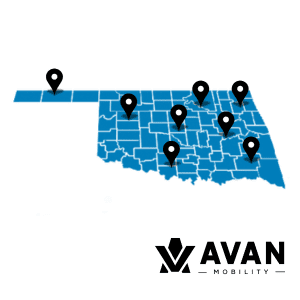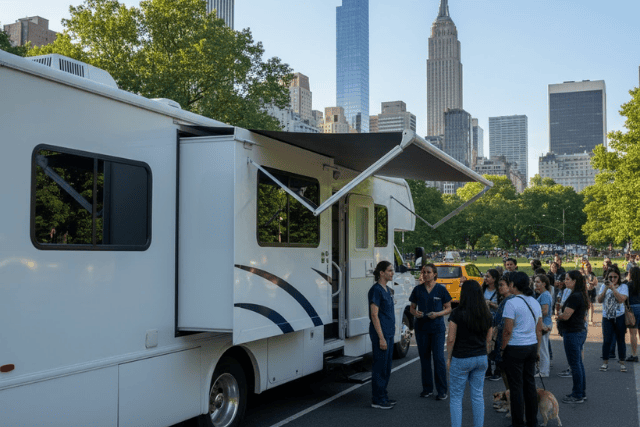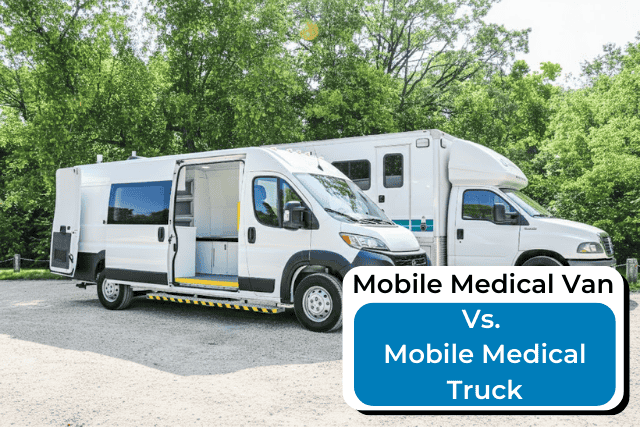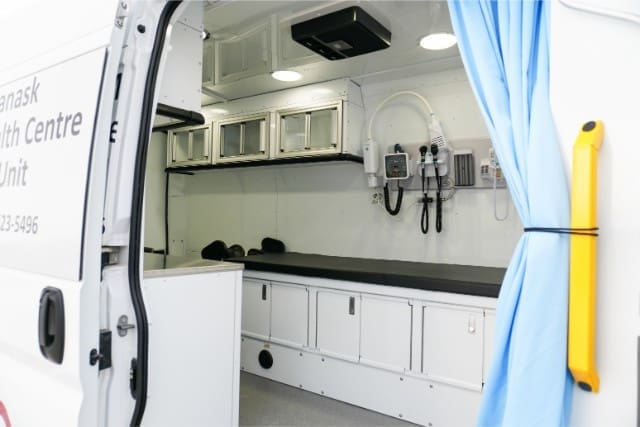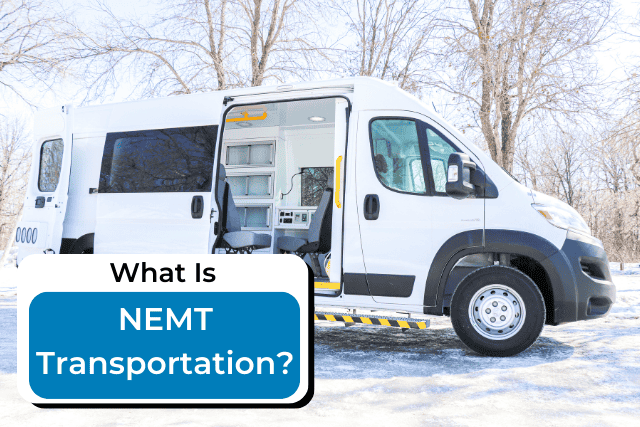Did you know that about 35% of Oklahomans live in rural areas where healthcare access is limited? That makes mobile care vital from Tulsa to the Panhandle. When you start planning, mobile clinic regulations in Oklahoma can feel like a maze.
- Who issues licenses?
- Where can you operate in Oklahoma City or rural towns?
- How do you handle meds and safety inside a moving clinic?
The gap is real. You want to serve people quickly and safely, but missing a rule could mean fines, delays, or worse, your community left without care. Picture instead having a clear, Oklahoma-ready checklist that helps you launch and operate with confidence. That’s the state you’re aiming for.
For over 10 years, AVAN Mobility has helped health teams, non-profits, and clinics launch mobile medical units across the U.S., including the Community Clinic of Southwest Missouri. We’re trusted because we listen first and build second, designing vehicles that support dignity, comfort, and real-world needs. And we know we’re not the only manufacturer out there, so this guide is written to be objective and focused on your needs.
Here’s what you’ll learn about mobile clinic regulations in Oklahoma:
- Who regulates what: State agencies and core rules.
- Licensing basics: Staffing, sanitation, and operations.
- Clinical and pharmacy rules: Medication, records, and safety.
What counts as a mobile clinic in Oklahoma?
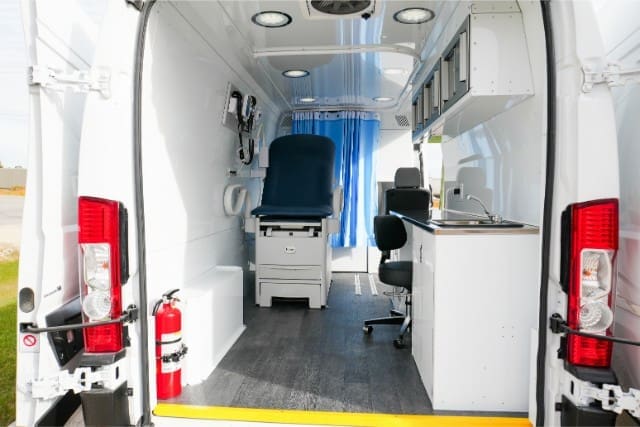
In Oklahoma, a mobile clinic is any van, trailer, RV, bus, or mobile home not fixed to the ground that works like a clinic. Think of it as your clinic on wheels. All the same rules that apply to a regular, stay-put clinic, like sanitation, equipment, and safety, apply to your mobile setup too.
What must a mobile clinic in Oklahoma include?
Here are the must-have basics for mobile clinics in Oklahoma:
- Hot and cold water sources: Just like in a regular clinic.
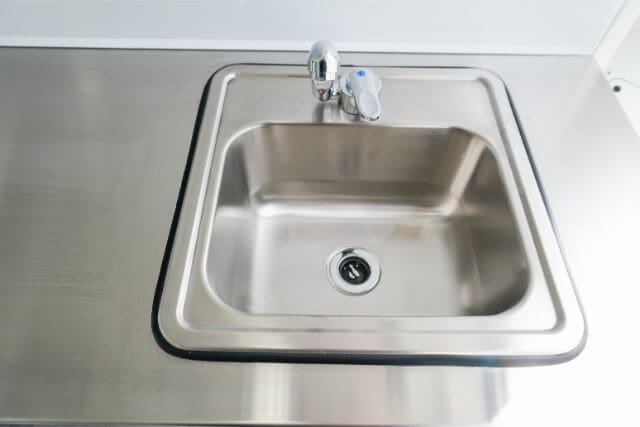
- Waste collection tank: You need a way to handle used water and waste.

- Reliable power source: This will ensure that your diagnostic tools and lights continue to work, even in remote areas. Learn about external power in a mobile clinic.
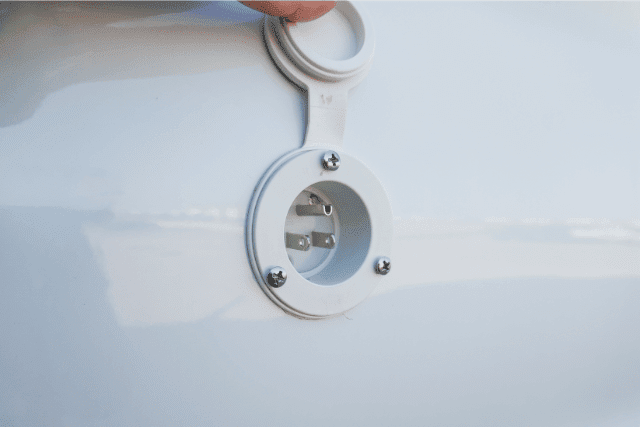
- Current visible licenses and permits: Display any original and certified copies of your licenses or permits in full view of the public.
What about medication and controlled substances?
If you’re dispensing meds:
- Safe storage: Store drugs in a safe, orderly way.
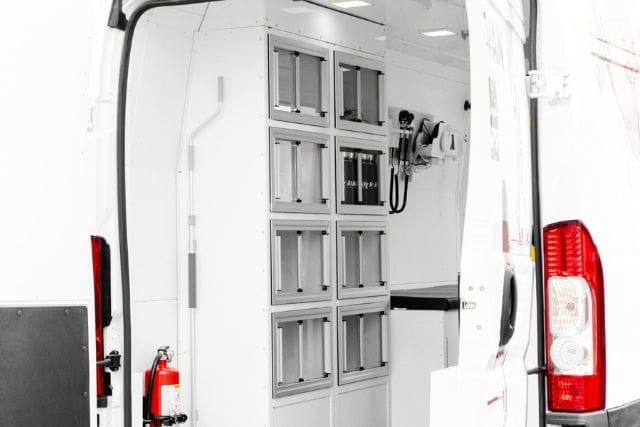
- Locked compartments: Controlled drugs need to be in a locked compartment that’s permanently attached to the vehicle.
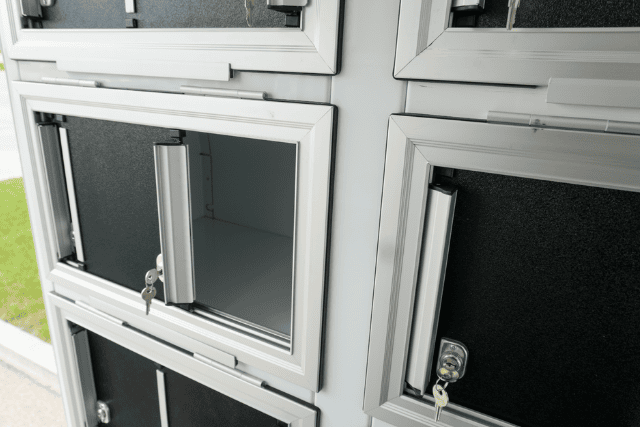
- You must keep copies of your DEA and Oklahoma Bureau of Narcotics certificates in the vehicle and be ready to show them if asked.
If you don’t have a DEA certificate, you cannot legally store, transport, or dispense controlled substances in your mobile clinic in Oklahoma.
What you can still do:
- Provide general medical care: You can run exams, do lab work, offer preventive care, and provide other non-prescription services.
- Write prescriptions: Licensed providers in your mobile medical unit can still write prescriptions for patients to fill at a local pharmacy. You just can’t hand out the medication directly.
- Offer OTC meds: Over-the-counter medications like Tylenol or ibuprofen don’t require DEA or OBNDD registration, so these can be stocked if part of your program.
What you can’t do:
- Keep or dispense controlled drugs: Anything classified as a controlled substance under federal or Oklahoma law is off-limits without those certificates.
- Operate a mobile pharmacy: You won’t be able to store a supply of prescription drugs in the unit.
If your model of mobile care requires dispensing, you’ll need to apply for both:
- DEA registration at the federal level
- OBNDD registration at the state level
7 steps to navigate the mobile clinic regulations in Oklahoma
In this section, we’ll walk you through the seven steps in navigating the mobile clinic regulations in Oklahoma.
Step 1: Map your services to align with mobile clinic regulations in Oklahoma
Before you start filling out random forms, you need to know what type of clinic you’re running. In Oklahoma, there isn’t a one-size-fits-all mobile clinic license. The rules change based on what you do.
- If you’re providing primary care: You may fall under the same rules as a regular physician office.
- If you’re running urgent care or surgery: You may be treated more like an Ambulatory Surgical Center (ASC).
- If you’re only offering screenings or outreach: The requirements can be lighter, but you still have to follow state health rules.
For building and facility questions, contact the Oklahoma State Department of Health. If you plan to bill Medicaid, reach out to the Oklahoma Health Care Authority. They also handle Oklahoma’s Health Information Exchange (HIE).
Where you go from here: Write down the exact services your unit will provide. Then call OSDH and OHCA to confirm which rules fit your model.
Step 2: Line up professional licenses under mobile clinic regulations in Oklahoma
Every provider who works in your mobile clinic must be licensed in Oklahoma. That means:
- Doctors: Licensed by the Oklahoma Board of Medical Licensure and Supervision.
- Nurses and nurse practitioners: Licensed by the Oklahoma Board of Nursing.
- Physician assistants: Must also be licensed and follow state supervision rules.
If your nurse practitioners or physician assistants will prescribe medications, they need prescriptive authority approved by their board.
Where you go from here: Make a list of everyone on your team. Verify each license is active, and keep copies of their credentials in your files.
Step 3: Handle meds under mobile clinic regulations in Oklahoma
As we talked about earlier, if you’re only writing prescriptions for patients to fill at a local pharmacy, you don’t need extra registrations. But if you plan to store, dispense, or transport medications, especially controlled drugs, there are two extra steps:
- Apply for a DEA registration.
- Apply for an OBNDD registration.
Without these, you cannot legally keep controlled substances in your mobile unit.
If your program includes a full pharmacy, you’ll also need a license from the Oklahoma Board of Pharmacy.
Where you go from here: Decide if you’ll only write prescriptions or if you want to dispense medications on board. If dispensing is part of your plan, apply for DEA and OBNDD registrations first.
Step 4: Set up labs and imaging under mobile clinic regulations in Oklahoma
Many mobile clinics offer quick tests like flu swabs, strep tests, or blood sugar checks. To do that, you need a CLIA certificate. This is a federal program, but Oklahoma helps manage it.
If you want X-ray equipment in your vehicle, you need to register both the machine and the people running it with the Oklahoma Department of Environmental Quality. OSDH also oversees safety rules for patients and staff. Your unit also has to meet strict safety standards that cover shielding, calibration, operator distance, and proper tube adjustments. These rules are in place to keep patients, staff, and the public safe from excess radiation.
To use X-rays, you’ll also need to submit specific DEQ forms, such as Form 410-11-1 (permit for radiation equipment) and Form 410-11-2 (registration of therapeutic systems). Operators must hold the right permits, so make sure your team is trained and licensed before use.
Where you go from here: Make a list of all tests you’ll run on-site. Apply for the right CLIA certificate and register any imaging equipment before you use it.
Step 5: Join the HIE and protect privacy under mobile clinic regulations in Oklahoma
Oklahoma has a statewide Health Information Exchange run by MyHealth Access Network. Providers are expected to participate unless they have an approved exemption. The goal is simple: share patient health information safely so care teams can see the full picture.
You also need to follow HIPAA rules. That means protecting patient records, locking laptops and tablets, and training staff on privacy. Mobile clinics face extra risk because records are often carried in and out of rural areas.
Where you go from here: Start the HIE enrollment process through OHCA, and review your HIPAA policies to make sure they cover mobile operations.
Step 6: Handle medical waste and sharps under mobile clinic regulations in Oklahoma
If you’re drawing blood, giving shots, or doing any procedure, you’ll create medical waste. In Oklahoma, the Department of Environmental Quality regulates how you handle it. You are considered the “generator” of the waste.
That means you need approved sharps containers, safe storage, and a contract with a licensed medical waste transporter to pick them up.
Where you go from here: Choose a DEQ-permitted waste vendor, keep pickup records, and train your staff on how to handle sharps safely.
Step 7: Register the vehicle and plan local parking under mobile clinic regulations in Oklahoma
Your mobile clinic is still a vehicle, so you need to title and register it with Service Oklahoma. If it’s oversized or heavy, check with ODOT for permits.
When setting up clinics in Tulsa, Oklahoma City, or smaller towns, check with city offices about parking rules. Some areas may require a special event permit to park on public streets.
Where you go from here: Keep your registration in the vehicle and talk with each city before setting up. Planning parking ahead of time avoids last-minute headaches.
Got any questions about mobile clinics?
You came here looking for clarity on mobile clinic regulations in Oklahoma. The gap was real: you wanted to launch a clinic but worried about getting tangled in rules, missing a license, or slowing down care for the people who count on you.
Now you know the path forward:
- Which state agencies regulate mobile health services in Oklahoma
- What your unit must include and how to handle meds, labs, imaging, and waste
- How to secure the right licenses for your staff, facility, and vehicle
- Where to go next with DEA, OBNDD, CLIA, DEQ, and city permits
At AVAN Mobility, we’ve spent over a decade helping health teams and non-profits bring mobile care to life. What sets us apart is how we build partnerships, not just vehicles. We walk with you through the regulatory maze, design a unit that supports both compliance and comfort, and stay by your side long after delivery. At the heart of it, we believe a clinic on wheels should feel like hope arriving at the curb. If you’d like to talk through your goals or ask questions, click the button below to connect with one of our mobility experts.
If you’re not ready to talk to a mobility expert yet, here are a few resources to guide you further:
